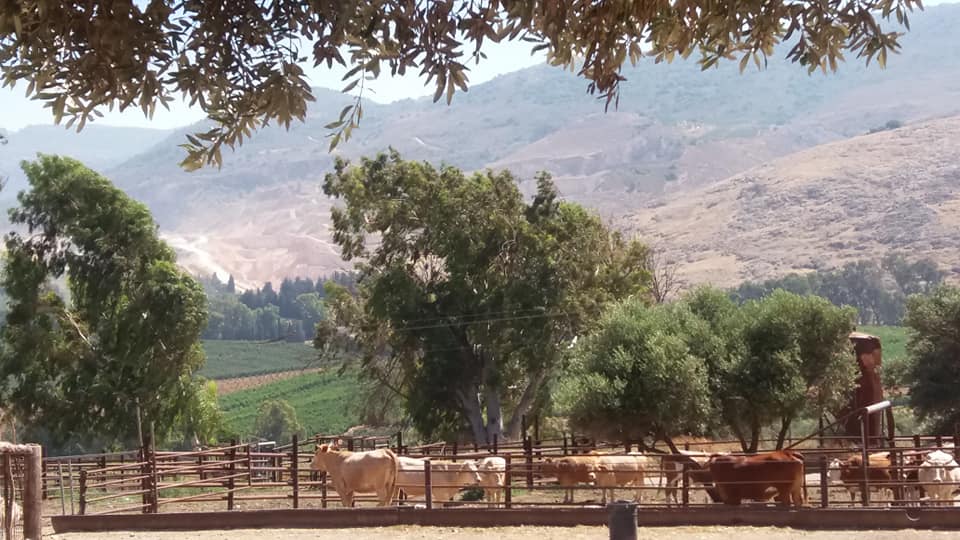Basia Monka – “Para para”… Take it easy and don’t think someone has just called a cow, twice
Living in Israel many people, not born here, often don’t learn Hebrew. Speaking English is enough, having French opens many doors, having as an extra Russian language, makes your life easy. For example, I was snorkeling in Eilat a couple of weeks ago, the lifeguard/trainer spoke only Russian. In the middle of the Red Sea, Russian was handy.
I believe, speaking the local language makes one a citizen, but even those who don’t speak Hebrew must know the local slang. Slang really gives you the insight, also if you are just passing by and visiting Israel.
So here we go! Some examples to just get you started.
“Para” means a cow in Hebrew, but if you hear someone saying it to you, don’t take it as assault. No reason to feel offended. No one is comparing you to this nice animal, and not twice, for sure. By saying “para para,” they just want you to slow down and take it easy.
But the language, just like things in life, it is all about the nuances. Things can get lost in translation very easily. If you skip the “a” at the end and say “parpar”, it will be a butterfly. Calling someone “parpar”, you say that he is changing partners pretty often, free as a bird.
Yet speaking yet of butterflies, if you want to make a tattoo saying butterfly in Hebrew, make sure to say the word in Hebrew, so you will not end up having a Hebrew tattoo: “Hema tasa” – meaning: a butter flies. True story…
Hebrew has three letters “H”. Not joking! You must be very careful to pronounce them properly. Otherwise, you can get in trouble. Never call you teacher (“ha-mora”) chamora (the female form of a donkey, ass). Hey, and Chet – using the correct letter makes a significant difference.
In the Hebrew slang there are many ways of addressing a person: “kapara” (the most googled word after the Eurovision contest), “neshama” (soul), “motek” (sweetie) “achi” or “ach sheli” (my brother), “adoni” (sir – used more by older people), there is no end to those words. But one can be very confusing. If you hear someone calling you “mamee”, don’t think he or she wants to be adopted by you, it’s just a form of sweetie, dear, that Israelis like to use addressing people they know and those they just met and will never see again.
After my over four years in Israel, there are Hebrew terms I cannot translate, but also I cannot live without them. One of them is “Tahles”, some translate as a bottom line, some as priceless, but really there is no good translation to this term. As long you don’t mix it with Yiddish “tuches”, you are good.
Another of my favorites is “Walla”. Few days ago someone with Polish origins asked me, how to say “Walla” in Polish? There is not such a thing as “Walla” in Polish or in any other language, I know. This Arabic expression used very often in Israel, is the way of showing surprise or appreciation. Basically, if you want to show that you are listing to someone, put “Walla” in between the sentences. In a conversation it is also handful to use words: “legamre!” (totally), “magniv”, “achla” (both meaning cool, groovy, great, awesome).
I am not a big fun of using “what a shame” in any other language, as life is too short to regret, but somehow Hebrew “chaval” comes of my mouth pretty often also when I speak in a different language. It is just very simple, short and useful term.
– You cannot make to a concert?, – Chaval!
– You are stuck and work. – Chaval! Ect…
But the phrase: “Chaval al ha-zman” (literally: waste of time), often used when one really likes something, was hard for me to absorb. Imagine you are eating an amazing dish, and you hear: what a waste of time! I guess, it would be a waste of time not to try it… That’s what they mean.
On the other hand, if you want to say something was terrible or awful, use the phrase “al ha-panim” – on your face. And don’t ask me why.
And if you want to have fun, you are going out with friends, say: “Yalla Balagan”! Although Hebrew “balan”, as Polish “bałagan” means a mess (you can also say “eyze ballagan…” , meaning: what a mess), but the phrase “yalla ballagan” is simply: let’s have crazy fun! Let’s enjoy!
So there is a lot of contradictions in the Israeli idioms, lots of influences of various cultures, that’s why sometimes one may feel here “salad be rosh” – the salad in the head. Everything is mixed and not clear what taste it has or what decision to make. But at the end, “sof sof”, all here is “sababa” ! and “ha kol iye beseder” – everything will be all right.
Just take your time, “para para”…









